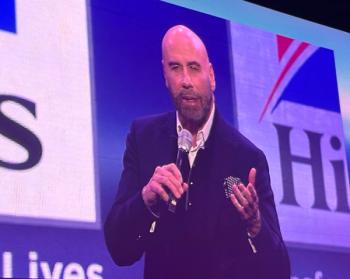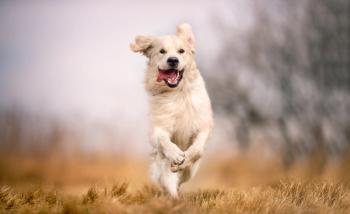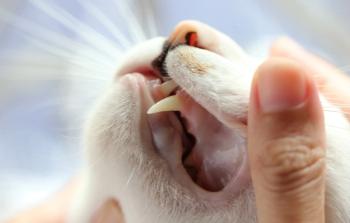
- dvm360 April 2024
- Volume 55
- Issue 4
- Pages: 17
Cornell University sees first reported case of spontaneous jaw regrowth
French bulldog’s jaw regrew after much of his lower left mandible was removed because of a tumor
Tyson, a 3-month-old French bulldog, was originally scheduled to see Cornell University’s dentistry and oral surgery service for cleft palate surgery, however, his primary care veterinarian noticed a cancerous tumor on his jaw.1 A majority of Tyson’s lower left mandible was taken out with removal of the tumor. Dentistry and oral surgery resident Alexandra Wright, DVM '18, led Tyson’s care team and explained to Tyson’s owners, Melissa Forsythe and Mike Lacagnina, that removing a major portion of the dog’s jaw meant Tyson will have to live the rest of his life without full function of his jaw.
“Tyson’s tumor was an oral papillary squamous cell carcinoma, which is a malignant cancer in dogs,” said Wright in a Cornell news article. “Oral squamous cell carcinoma is the second-most common malignant oral tumor in dogs, and this papillary subtype has previously been reported in young dogs.”1
In better news, though, Tyson’s jaw spontaneously regrew. According to Cornell University College of Veterinary Medicine, this phenomenon has been documented in children, but this is the first reported case of its kind for dogs of any age or breed.1
“We didn’t know if we wanted to put a puppy through all this. The prognosis at the time was uncertain,” Forsythe explained in the news article. However, because Tyson’s CT scans showed the cancer did not spread, “we decided to give him a chance and continue with surgery. We had no idea his jaw would grow back.”1
While anecdotal instances of jaw regeneration in young dogs existed, Tyson's extensive bone removal made it improbable for such regrowth. Because of its uniqueness, Wright published a report on this case in Frontiers in Veterinary Science2 with co-authors Nadine Fiani, BVSc, associate clinical professor and section chief, and Santiago Peralta, DVM, DAVDC, associate professor in the dentistry and oral surgery service. The case report highlighted Tyson's remarkable outcome, attributing it to the preservation of a substantial amount of periosteum during surgery. This thin membrane covers bone surfaces, houses blood vessels, and nerves crucial for bone support and original mandible growth.2
The early detection of Tyson's tumor also most likely contributed to his extraordinary recovery, though the exact reason for his jaw regrowth remains a pioneering mystery. “More has to be done to understand the likelihood of this occurring in other dogs and if a specific age range makes a difference, but this case documents a very positive surgical outcome in a life-threatening situation,” Wright said.1
According to Cornell, Tyson’s new jaw is nearly as functional as the original, however it is not exactly the same, as it no longer has certain features. There is no mandibular canal, where major blood vessels and nerves typically reside. Tyson also does not have any teeth on the regrown section. Miraculously, the new left side is the same length as the one on the right, which helps prevent drifting. Currently, there is no evidence of cancer in the regenerated bone or anywhere else in Tyson’s body.1
Tyson’s owners reported that the Frenchie still avoids hard, crunchy food and stiff, solid, or plastic toys, but he is able to eat water-soaked kibble and play with soft, plush toys. Tyson still checks in with Wright and the team at Cornell on a regular basis. He even recently celebrated his first birthday.
A more in-depth look at Tyson’s revolutionary medical situation can be found in Wright’s published case report.2
References
- Greaver Cordova M. French bulldog puppy spontaneously regrows jaw. News release. Cornell University College of Veterinary Medicine. February 1, 2024. Accessed February 5, 2024.
https://www.vet.cornell.edu/news/20240201/french-bulldog-puppy-spontaneously-regrows-jaw - Wright A, Peralta S, Fiani N. Case report: Spontaneous mandibular body regeneration following unilateral subtotal mandibulectomy in a 3-month-old French bulldog. Front Vet Sci. 2023;(10). doi.org/10.3389/fvets.2023.1281232
Articles in this issue
over 1 year ago
Keeping up with our Kansas City keynote speakersover 1 year ago
There’s so much in store for the graduating class of 2024over 1 year ago
Dirofilaria immitis: The monster then and nowover 1 year ago
Stay competitive—and ethicalover 1 year ago
A new name for “drop-off”almost 2 years ago
dvm360® product report: AI radiology, plus feline pain toolkit, and morealmost 2 years ago
Striving for equity in veterinary medicinealmost 2 years ago
The hardest job in a hospital (according to a veterinarian)almost 2 years ago
How to get clients to say “Yes” and adhere to recommendationsNewsletter
From exam room tips to practice management insights, get trusted veterinary news delivered straight to your inbox—subscribe to dvm360.





